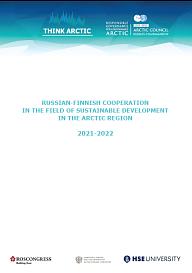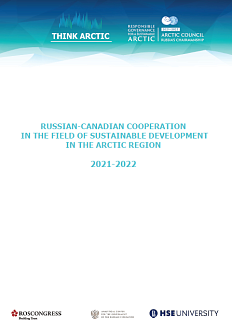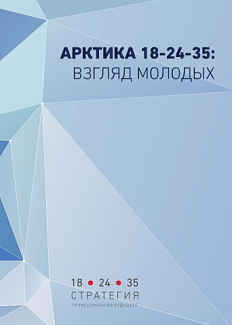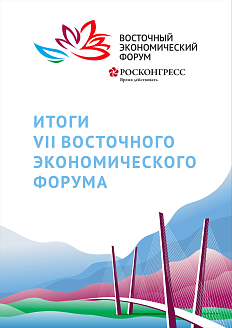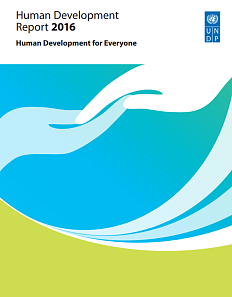The report was prepared as a result of the event «Russian-Finnish Cooperation in the Field of Sustainable Development in the Arctic Region» as part of the ThinkArctic Project, organized by the Roscongress Foundation, the Center for Comprehensive European and International Studies, and the Analytical Center for the Government of the Russian Federation. ThinkArctic Project will be conducted within the Program of the Russian Chairmanship in the Arctic Council during 2021-2023.
Main goals and priorities in the Finland’s Strategy for the Arctic Policy
For many years Finland has been an active member of international organizations for the development of the Arctic region, namely the Arctic Council and the Barents Euro-Arctic Council. Finland’s interest in development and cooperation in the Arctic is due to a complex of factors, including its geographical location, climate change, and the indigenous people of the Arctic. Even though the country does not have access to the Arctic Ocean, it has accumulated significant experience in the Arctic research and expertise in icebreaking construction and conducting economic activities in the region.
In 2021, Finland adopted the new Strategy for the Arctic Policy . Its goals and priorities correspond to the UN Sustainable Development Goals and are aimed at achieving them. The priority areas for Finland’s Arctic activities until 2030 include:
— inhabitants, promotion of well-being, and the rights of the Sámi as an indigenous people;
— expertise, livelihoods, and leading-edge research;
— infrastructure and logistics.
Mechanisms and formats of cooperation
Finland’s Arctic policy in the field of sustainable development is implemented both through multilateral cooperation within Arctic institutions and through Finland’s bilateral relations with the Arctic states. According to the Finland’s Strategy for the Arctic Policy, the country advocates for maintaining peace and security in the region through international cooperation. Finland participates in the following formats of multilateral cooperation:
— Barents Euro-Arctic Council;
— International environmental agreements.
Bilateral mechanisms and cooperation with the EU
Most international projects in which Finland takes part are conducted on a bilateral basis. Projects with Denmark and Iceland are aimed at countering and adapting to climate change, protecting the environment, and combating marine litter. Projects with Norway focus on the exploitation of Arctic oil and gas resources for Europe’s energy supply. Cooperation with Canada is traditionally conducted in the field of winter navigation, icebreaking, and shipbuilding; joint projects in the field of circular economy are planned as well. Finland implements projects with the USA, which are related to climate change and focused on air and water purification. In 2015, Finland and Sweden created a joint combat group to «carry out maritime surveillance». Finland joins some European projects in the Arctic region, since economic activity in the EU and its climate policy have a significant impact on the Arctic region. The core mechanism of cooperation between Finland and the EU in the Arctic is the Cross-border Cooperation Programs (CBC) launched by the European Neighborhood and Partnership Instrument in 2007. The CBC cover Sweden, Finland, Russia, and Norway.
Russian — Finnish Cooperation in the field of sustainable development
Despite some existing restrictions related to the sanctions and the COVID-19 pandemic, Finland and Russia maintain a close political dialogue, the leaders of both states exchange views on the development of bilateral relations regularly, in the Arctic region as well.
Among the spheres of cooperation in the field of sustainable development between Russia and Finland are forestry, carbon-free energy, waste management, new technologies in construction, icebreaker production, infrastructure, information technologies. Countries support cultural dialog and scientific exchanges as well.
Russia and Finland cooperate more closely within multilateral formats. Major institutions of multilateral cooperation are:
— Programs of Cross-Border Cooperation «Kolarctic», «Karelia», «South-East Finland — Russia».
Cooperation between Russia and Finland is carried out within the framework of the Arctic Council. Russia and Finland are the leads of the «Biosecurity in the Arctic» project, which has started in 2021. The project is being managed in collaboration with the Arctic Monitoring and Assessment Program (AMAP). Finland, Russia, the USA, and Iceland are working on a project in the field of environmental protection. The title of this project is «Advancing Arctic Resilience: Information, capacity, and networks for navigating impacts of permafrost thaw». This project will provide a roadmap for addressing the impacts of permafrost thawing. The results of the project will contribute to solving several UN SDGs. Currently, the Sustainable Development Working Group (SDWG) is completing a project related to food security, which is titled «Arctic Foods Innovation Cluster (AFIC)».
For more than a decade, Russia and Finland are closely cooperating within the framework of the EU’s Cross-Border Cooperation programs, such as «Kolarctic», «Karelia» and «South-East Finland — Russia». Several regions of Northwestern Federal District, such as the Republic of Karelia, Murmansk, Arkhangelsk, and Leningrad regions, Nenets Autonomous District, and Saint Petersburg are covered by these programs. The initial focus of these programs was mostly on economic and infrastructural activities, for example, development of small and middle-sized businesses, and improvement of the quality of life. However, currently, the focus is gradually shifting to sustainable development issues, such as environmental protection, support of indigenous peoples, and improving the wellbeing of the people.
Prospects for Russian-Finnish cooperation
Considering the current state of Russian-Finnish relations, the main formats of cooperation in the field of sustainable development in the Arctic will be the Arctic Council and bilateral cooperation under state and non-governmental institutions. Сross-border cooperation programs such as «Kolarctic», «South-East Finland — Russia» and «Karelia» will remain an important mechanism of cooperation, however the project portfolio could be significantly expanded.
The most promising areas of cooperation in the field of sustainable development are:
- Ecology and environmental protection
Russia and Finland have significant experience in cooperating in the field of environmental protection. Several agreements have already been reached in marine ecosystems protection (for example, response to oil spills in the Arctic). However, increasing rates of climate change and the aggravation of climate risks should lead to intensification of cooperation in this field. Cooperation in this area would contribute to the achievement of SDG 13 — Climate Change, SDG 14 — Life below Water, and SDG 6 — Clean Water and Sanitation. Projects in the field of improving the quality of fresh water, ensuring the sustainable use of water systems, projects in the field of monitoring and assessment of the climate change in the Arctic seem to be promising. Russia and Finland have significant experience in cooperating in the field of environmental protection. Several agreements have already been reached in marine ecosystems protection (for example, response to oil spills in the Arctic).
- Energy
Essential part of the Arctic sustainable development is decarbonization and transition to renewable energy, hence cooperation under SDG 7 — Affordable and Clean Energy appears to be plausible. In this regard, a promising area for cooperation is wind power production. The use of Finnish experience in sustainable production of biofuels from wood waste can play a significant role in expanding the use of renewable forest resources in the Russian Arctic. Cooperation in nuclear energy will continue, considering that currently «Rosatom» participates in the project aimed at constructing a nuclear power plant in Ostrobothnia (Finland).
- Transport and logistics infrastructure development
Underdeveloped system of roads and railways is a serious problem in the Arctic region. Therefore, to address this issue, intensive work is required under SDG 9 — Industrialization, Innovation, and Infrastructure, SDG 11 — Sustainable cities and Communities. The development of transport infrastructure will significantly increase the region’s accessibility for both the local population and tourists.
- Telecommunications development
The expansion of cellular networks and the laying of fiber optic lines will significantly improve quality of life in the Arctic, allow access to educational resources, medicine, work remotely, and digitalization of business processes will promote entrepreneurial activity and contribute to the economic development of the region. These project directions have strong connection with SDG 4 — Quality Education, SDG 8 — Decent Work and Economic Growth.
- Tourism
The unique nature of the region, the Arctic has high potential for ecological sustainable tourism, with a focus on «closer to nature» and recreation. Therefore, work in this area relates to SDG 9 — Industrial¬ization, Innovation, and Infrastructure and SDG 15 — Life on Land. One of the interesting cases in this area of cooperation is the tripartite national park «Pasvik-Inari», located on the territory of Russia, Finland, and Norway. It is possible to create tourist clusters based on large cities and sub-regions of the Arctic (Murmansk, Arkhangelsk, Cape Zhelaniya, Yamal, Khatanga, Oymyakon).
- Healthcare
The healthcare issue has always been relevant. However, the importance of healthcare has drastically increased after COVID‑19 outbreak. To ensure a high level of medicine in the region, even in sparsely populated areas, the development of telemedicine is required (SDG 3 — Good Health and Well-being), as well as the creation of transport (aviation) infrastructure for the timely provision of medical care on both sides of the Russian-Finnish border.
- Indigenous peoples, cultural ties
Promising areas of cooperation are the preservation of the indigenous culture, the use and popularization of their language (within the region), the possibility of teaching it, and the support of indigenous and traditional crafts. Such projects can be organized within the framework of the Arctic Council since the organizations of the indigenous peoples of the Arctic (the Sámi Union, the International Gwich’in Council, the Arctic Athabaskan Council, the Aleutian International Association, the Inuit Circumpolar Council, the Association of Indigenous Peoples of the North, Siberia, and the Far East of the Russian Federation) are permanent participants of the Arctic Council.
- Science and education
In this area, consortia of universities, joint online courses of Finnish and Russian universities could be established so that residents of the Arctic regions could get access to high-quality inter national education, which meets SDG 4 — Quality Education.
- Human capital
Russia intends to take measures to improve the quality of life in the Arctic, which is also enshrined in the Program of Russian Chairmanship in the Arctic Council and can contribute to the achievement of SDG 8 — Decent Work and Economic Growth and SDG 11 — Sustainable Cities and Communities. In this regard, it is necessary to focus on strengthening the scientific potential of the region, developing scientific exchange. This could be achieved through establishing new scientific centers in the Arctic and holding joint scientific conferences under existing institutions in order to work out new creative approaches to the region management.
- Business and innovation
Improving the investment climate, stimulating the development of small and medium-sized businesses, attracting new technologies and innovations to existing and new industries will help unlock the potential of the Arctic region.
For more information, see the special sections of the Roscongress Foundation Information and Analytical System: The Arctic, Sustainable Development, dedicated to the issues of sustainable development of the Arctic; Tourism, Culture, Healthcare, Entrepreneurship, that contain materials on the tourism, culture, healthcare, entrepreneurship.


